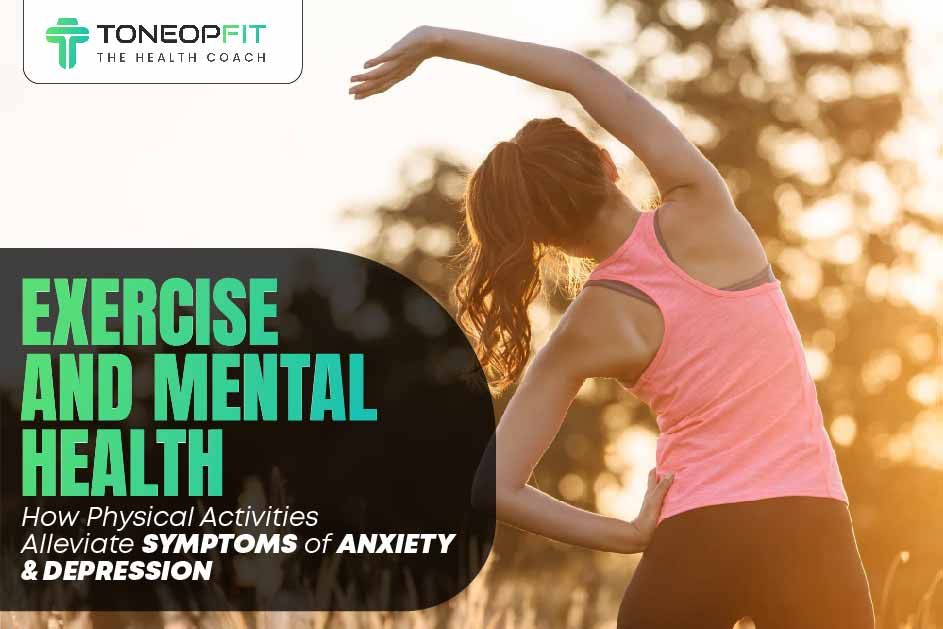The connection between exercise and mental health is profound and widely acknowledged. When you engage in physical activity, your body releases endorphins, often called "feel-good" hormones, which can lift your spirits and enhance your overall mood. Whether it is a leisurely walk in the park or a rigorous gym session, exercise can remarkably alleviate stress, anxiety, and depression by reducing the levels of cortisol, our body's primary stress hormone.
Furthermore, regular physical activity can improve the quality of your sleep, boost your self-esteem, and sharpen your cognitive abilities, including memory and concentration.
Beyond the immediate effects, exercise offers long-term benefits for your mental well-being. By integrating physical activity into your daily lives, you not only reduce the risk of developing mental health conditions but also cultivate resilience and a sense of accomplishment.
This blog is all about understanding the intricate connection between exercise and mental health, and exploring how exercise can cultivate resilience within while alleviating mental health challenges. Let’s get into the topic now.
Table of Contents
1. How Does Exercise Affect Your Mental Health?
2. Can Exercise Help Anxiety?
3. Why Is Exercise A Stress Reliever?
4. How Does Exercise Improve Mood?
5. Expert’s Advice
6. The Final Say
7. FAQs
8. References
How Does Exercise Affect Your Mental Health?

Exercise and mental health are correlated through various physiological and psychological mechanisms. Regular exercise causes specific vital changes in our bodies. Let’s have a look at the link between exercise and mental health, and how one affects the other:
1. Endorphins And Mood Regulation
Exercise triggers the release of endorphins, neurotransmitters known for their mood-enhancing effects. These endorphins interact with receptors in the brain, reducing pain perception and inducing feelings of euphoria and well-being. By promoting positive mood states, exercise can alleviate symptoms of stress, anxiety, and depression. Exercise and mental health are therefore connected.
2. Cortisol Regulation And Stress Management
Regular exercise and mental health are connected as physical activity helps regulate cortisol levels, the body's primary stress hormone. Elevated cortisol levels are associated with increased stress and anxiety and disrupted sleep patterns. By engaging in physical activity, individuals can effectively manage stress and promote a more balanced stress response, contributing to overall emotional resilience.
3. Enhanced Sleep Quality
Exercise is crucial in improving sleep quality by regulating the body's circadian rhythm. Physical activity promotes more profound and restorative sleep, essential for cognitive function, emotional regulation, and mood stability. By facilitating better sleep patterns, exercise supports optimal mental well-being.
4. Self-Esteem And Confidence Boost
Engaging in regular exercise can boost self-esteem and confidence through various mechanisms. Setting and achieving fitness goals fosters a sense of accomplishment and mastery, leading to increased self-efficacy and a more positive self-image. Participating in group exercise or team sports promotes social connections and a sense of belonging, which is vital for mental health and emotional support.
Also Read: 5 Proven Benefits Of Walking Every Day
5. Long-Term Mental Resilience
Exercise offers long-term benefits for mental health, including a reduced risk of mood disorders such as depression and anxiety. By promoting neuroplasticity, the brain's ability to adapt and change, exercise stimulates the growth of new neurons and enhances synaptic connections. This process protects against cognitive decline and improves mood regulation, contributing to overall mental resilience and well-being. This is how exercise and mental health work are related.
Also Read: Weekend Exercises: Boost Your Fitness Levels With
Can Exercise Help Anxiety?
Exercise and mental health have so many roles together for your holistic health. Hence, the following ways to cure the symptoms of anxiety and depression:
Neurochemical Balance | Exercise encourages the release of endorphins, which are natural mood enhancers. These chemicals interact with our brain's receptors, reducing pain perception and promoting feelings of happiness. Exercise increase serotonin and dopamine levels, which helps regulate mood and relaxation. By balancing these neurotransmitters, exercise can effectively alleviate feelings of anxiety. |
Stress Hormone Regulation | Exercise and mental health are connected as they manage cortisol levels, our body's stress hormone. When cortisol levels are high, you often experience increased stress and anxiety. Exercise acts as a regulator, bringing cortisol levels back into balance, reducing anxiety symptoms and promoting a calmer state of mind. |
Relaxation and Stress Relief | Engaging in exercise provides a healthy outlet to release tension and stress. Whether going for a run or practising yoga, physical activity helps distract you from anxious thoughts and promotes relaxation. This can help us cope better with stressors and feel more at ease in our daily lives. |
Enhanced Sleep Quality | Anxiety can disrupt your sleep patterns, leading to restless nights and fatigue. Exercise can improve sleep quality by regulating our body's internal clock and promoting more profound, more restful sleep. By getting better sleep, we can reduce anxiety levels and feel refreshed and energised during the day. |
Social Connection | Participating in group exercise activities can foster social connections and support networks. Connecting with others through physical activity can reduce feelings of loneliness and isolation, which are common triggers for anxiety. Building relationships and having a support system can provide encouragement and a sense of belonging, helping us manage stress more effectively. |
Also Read: 10 Summer Workout Tips Exercises & Workout Plan
Why Is Exercise A Stress Reliever?
Including regular physical activity in your daily routine can help manage stress and maintain well-being. The following ways it helps in relieving stress:
1. Brain Chemicals
Exercise prompts the release of various neurotransmitters and hormones, including endorphins, serotonin, and dopamine. Endorphins, often called the body's natural painkillers, promote feelings of well-being and act as mood boosters.
Serotonin, known as the "happiness hormone," helps regulate mood, appetite, and sleep, contributing to calmness and relaxation. Dopamine, associated with pleasure and reward, reinforces positive feelings and motivation. Together, these chemicals create a biochemical environment in the brain that counteracts stress and promotes a more positive outlook.
2. Brain Plasticity And Adaptation
Regular exercise has been linked to enhanced neuroplasticity, which is the brain's ability to reorganise and adapt. Physical activity stimulates the production of brain-derived neurotrophic factor (BDNF), a protein that supports the growth and survival of neurons. Increased levels of BDNF can improve cognitive function, mood regulation, and stress resilience.
Additionally, exercise promotes the formation of new neural connections, strengthening neural pathways associated with stress-coping mechanisms and emotional regulation. These neurological adaptations contribute to the stress-relieving effects of training over time.
3. Mind-Body Connection
Engaging in physical activity requires focus and concentration, which can help shift attention away from stressors and worries. Activities such as yoga, tai chi, and mindful walking incorporate mindfulness and deep breathing elements, promoting relaxation and inner peace. By connecting the mind and body, these practices encourage a sense of grounding and presence in the moment, reducing stress's impact on mental and physical well-being.
4. Stress Hormone Regulation
Exercise helps regulate the body's stress response by reducing cortisol levels, the primary stress hormone. Cortisol levels typically rise in response to stressors, triggering physiological changes such as increased heart rate and blood pressure. Regular physical activity helps lower cortisol levels, promoting a more balanced stress response and preventing the negative effects of chronic stress on the body and mind. Exercise can also enhance the body's ability to recover from stress by improving cardiovascular fitness and resilience to stress-related health conditions.
5. Social Support And Connection
Participating in group exercise activities or team sports can provide valuable social support and connection, which is essential for stress relief. Interacting with others in a supportive environment fosters a sense of camaraderie and belonging, reducing feelings of isolation and loneliness. Sharing experiences and challenges with like-minded individuals can provide emotional validation and perspective, making coping with stressors and navigating difficult situations easier.
Also Read: Super Brain Yoga: Discover Its Procedure, Benefits
How Does Exercise Improve Mood?
Regular exercise has been shown to improve mood through various mechanisms. Firstly, physical activity triggers the release of endorphins, neurotransmitters acting as natural painkillers and mood elevators. These endorphins interact with receptors in the brain to reduce feelings of pain and induce a sense of euphoria and well-being.
Second, exercise increases the production of serotonin, a neurotransmitter known as the "happiness hormone." Serotonin plays a crucial role in regulating mood and promoting relaxation. Moreover, physical activity stimulates the release of dopamine, which is a neurotransmitter associated with pleasure and reward. This reinforces positive feelings and motivation.
Together, these neurochemical changes create a biochemical environment in the brain that promotes happiness, reduces stress, and enhances mood. The sense of accomplishment and empowerment gained from achieving fitness goals or participating in physical activities contributes to a positive self-image and improved mood.
Expert's Advice
As a dietitian, I often emphasise the vital role of exercise in promoting mental health alongside a balanced diet. Integrating regular physical activity into your daily routine is crucial to support your body and mind. I recommend a mix of aerobic exercises, strength training, and flexibility activities to maximise the benefits.
Consistency is key, so finding activities you enjoy and can sustain over time is essential. Alongside exercise, focusing on a nutritious diet is necessary. I advise including plenty of fruits, vegetables, whole grains, lean proteins, and healthy fats in your meals to provide the nutrients needed for energy, recovery, and optimal brain function. Combining exercise with a wholesome diet can enhance your mental well-being and overall quality of life.
Health Expert
Dr. Aditi Upadhyay
The Final Say
The link between exercise and mental health is no longer a secret. While exercise isn't a cure-all, incorporating physical activity into your routine can be a powerful tool for managing symptoms of anxiety and depression. From boosting feel-good chemicals in your brain to promoting better sleep and reducing stress hormones, exercise offers a natural and effective way to support your mental well-being.
Remember, consistency is key. Aim for at least 30 minutes of moderate intensity exercise most days of the week and find activities you enjoy. Start slow, listen to your body, and gradually increase the intensity and duration of your workouts as your fitness improves.
FAQs
1. What are the 10 benefits of exercise on the brain?
Here are the top 10 benefits of exercise on mental health and brain:
- Better sleep
- Energy
- Alleviate depression
- Exercise builds stronger bones
- Reduce stress
- Weight loss
- Lower blood pressure
- Reduce the risk of Chronic Disease
- Exercise promotes confidence
- Improves your confidence
2. Which are regarded as the best mental exercises for anxiety and depression?
Here are some of the simple and effective mental health exercises:
- Mindfulness meditation
- Cognitive-behavioral therapy (CBT)
- Progressive muscle relaxation
- Deep breathing exercises
- Journaling
3. Can you tell me about the best exercise for mental health?
Aerobic exercises, such as running, swimming, or cycling, are often regarded as the best exercises for mental health due to their ability to boost mood, reduce stress, and improve cognitive function through the release of endorphins and other feel-good neurotransmitters.
4. What is the correlation between fitness and mental Health?
The mental benefits of exercise include lifting mood, reducing stress, and enhancing cognitive function. Scientifically, physical activity triggers the release of neurotransmitters like endorphins, serotonin, and dopamine, which are known to promote feelings of happiness and well-being.
5. How are depression and mental exercises linked?
Exercise is acknowledged for its ability to alleviate symptoms of depression by increasing the production of mood-enhancing neurotransmitters such as endorphins, serotonin, and dopamine. These chemicals help regulate mood and reduce feelings of sadness and despair.
6. What is the correlation between working out and depression?
Regular exercise positively impacts mental health by reducing symptoms of stress, anxiety, and depression. Scientifically, physical activity stimulates the release of endorphins and other neurotransmitters while also improving self-esteem, enhancing sleep quality, and fostering overall well-being.
References
- Frontiers | The direct effect of exercise on the mental health of scientific and technological professionals and the mediating effects of stress, resilience, and social support (frontiersin.org)
- The Role of Exercise in Management of Mental Health Disorders: An Integrative Review | Annual Reviews
- SciELO - Brazil - Physical activity, exercise, and mental disorders: it is time to move on Physical activity, exercise, and mental disorders: it is time to move on
About ToneOp Fit
ToneOp Fit is a platform dedicated to improving and maintaining good health through a comprehensive range of goal-oriented health plans with up to 3 Coach support. The app offers Weight Management, Medical Condition, Detox, and Face Yoga Plans and also provides premium health trackers, recipes, and health content. Get customised diet, fitness, naturopathy, and yoga plans and transform yourself with ToneOp.









































